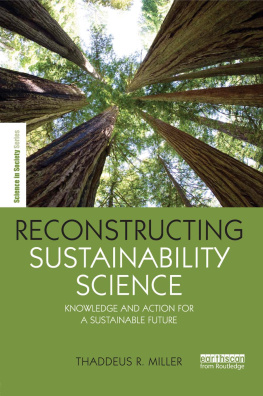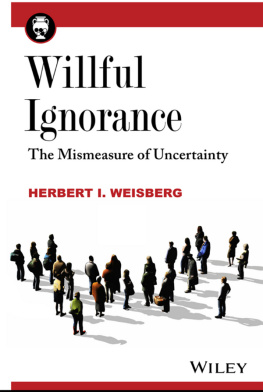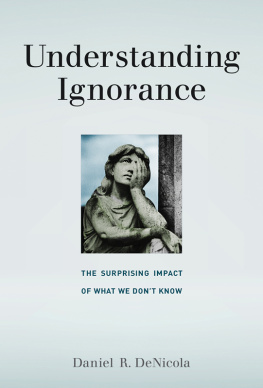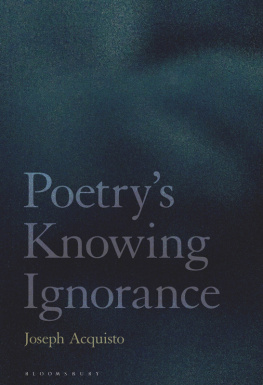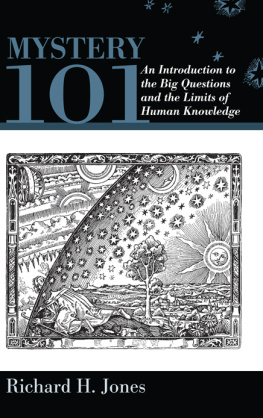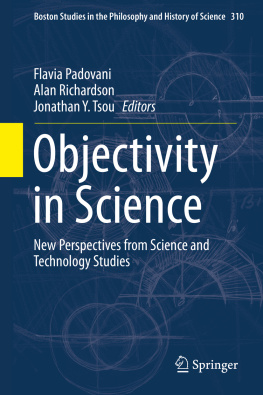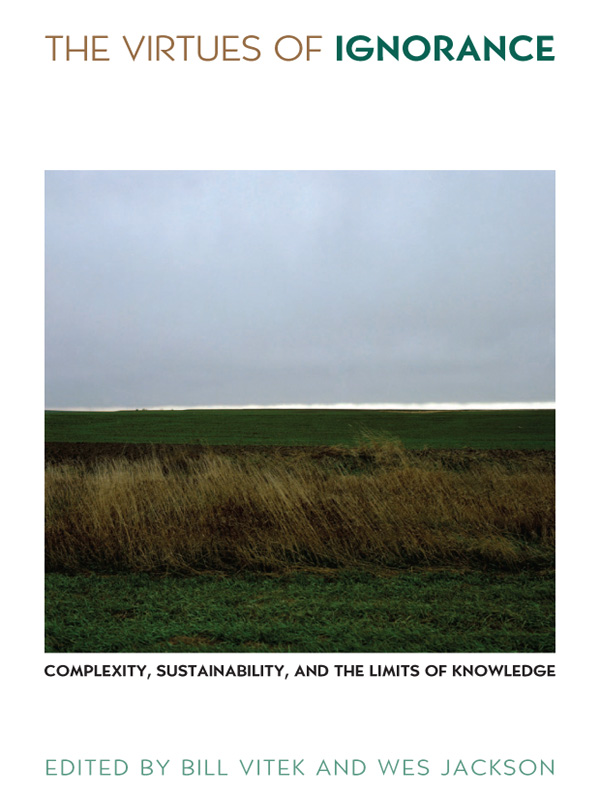This series is devoted to the exploration and articulation of a new agrarianism that considers the health of habitats and human communities together. It demonstrates how agrarian insights and responsibilities can be worked out in diverse fields of learning and living: history, science, art, politics, economics, literature, philosophy, religion, urban planning, education, and public policy. Agrarianism is a comprehensive worldview that appreciates the intimate and practical connections that exist between humans and the earth. It stands as our most promising alternative to the unsustainable and destructive ways of current global, industrial, and consumer culture.
The Virtues
of Ignorance
Complexity, Sustainability,
and the Limits of Knowledge
EDITED BY BILL VITEK AND WES JACKSON
THE UNIVERSITY PRESS OF KENTUCKY
Copyright 2008 by The University Press of Kentucky except as noted below.
Introduction: Taking Ignorance Seriously copyright 2008 by Wes Jackson.
The Way of Ignorance copyright 2005 by Wendell Berry from The Way of Ignorance. Reprinted by permission of Shoemaker & Hoard Publishers. All other rights remain with the author.
Toward an Ignorance-Based World View, copyright 2005 by Wes Jackson, first appeared, in slightly different form, in The Land Report 81 (Spring 2005) and is reprinted here courtesy of the author.
Toward an Ecological Conversation first appeared in the online newsletter NetFuture 127 (January 10, 2002) and was reprinted in the New Atlantis as A Conversation with Nature (Fall 2003). It is reprinted here, in slightly different form, courtesy of the author.
The University Press of Kentucky
Scholarly publisher for the Commonwealth,
serving Bellarmine University, Berea College, Centre College of Kentucky, Eastern Kentucky University, The Filson Historical Society, Georgetown College, Kentucky Historical Society, Kentucky State University, Morehead State University, Murray State University, Northern Kentucky University, Transylvania University, University of Kentucky, University of Louisville, and Western Kentucky University. All rights reserved.
Editorial and Sales Offices: The University Press of Kentucky
663 South Limestone Street, Lexington, Kentucky 40508-4008
www.kentuckypress.com
All books in the Culture of the Land series are printed on acid-free recycled paper meeting the requirements of the American National Standard for Permanence in Paper for Printed Library Materials.

12 11 10 09 08 5 4 3 2 1
Library of Congress Cataloging-in-Publication Data
The virtues of ignorance : complexity, sustainability, and the limits of knowledge / edited by Bill Vitek and Wes Jackson.
p. cm.(Culture of the land)
Includes bibliographical references and index.
ISBN 978-0-8131-2477-3 (hardcover : alk. paper)
1. AgriculturePhilosophy. 2. Sustainable agriculture. 3. Sustainable development.
4. Philosophy and science. 5. Nature and civilization. 6. Conservation of natural
resources. 7. Ignorance (Theory of knowledge) I. Vitek, William, 1957-II. Jackson,
Wes. III. Series.
S494.5.P485V57 2008
601dc22 2007048494
Manufactured in the United States of America.

Member of the Association of
American University Presses
ACKNOWLEDGMENTS
The editors wish to acknowledge and thank the many folks who worked behind the scenes and welcomed us to Matfield Green, Kansas, in the summer of 2004 for the meeting that resulted in this book as well as those whose work is not present here but whose participation enriched the gathering: Ronnie and Tom Armstrong, Ben Champion, Toots Conley, Robert Day, Dennis Dimick, Liz Granberg, Gayle Lasater, Dan Lesh, David Orr, Donna Prizgintas, Sister Helen Ridder, Virginia Smith, Clara Jo, Phyllis and Crystal Talkington, Arion Thiboumery, Kim and Travis Todd, and Fred Whitehead.
The editors also thank Steve Wrinn and his expert staff and editorial reviewers at the University Press of Kentucky for their care and attention at every step of the publication process.
Bill Vitek acknowledges Clarkson University, the Center for Humans and Nature, and the Land Institute for their support of his work in 2007 to bring this book to press.
Wes Jackson acknowledges Darlene Wolf, Jerry Glover, and his staff at the Land Institute.
INTRODUCTION
Taking Ignorance Seriously
Bill Vitek and Wes Jackson
How can we remember our ignorance, which our growth requires, when we are using our knowledge all the time?
Henry David Thoreau
THE QUESTION
Since we're billions of times more ignorant than knowledgeable, why not go with our long suit and have an ignorance-based worldview?
A few years ago, some well-known scientists published a paper, followed by a book, in which they assigned a dollar value to nature's services. The exercise doubtlessly has increased awareness of what ordinary accounting does not count, but we have no idea how such calculations can be reasonably made. We don't even know the full role of any of the species that have been discovered, let alone those not discovered or never to be discovered. And then there are the physical forces at work on our behalfglobal climate, for examplesome of which we have clearly altered by our presence. This effort to assign a dollar value represents the current zenith of Enlightenment thought.
It is our contention that a knowledge-based worldview lies at the very center of the Enlightenment perspectiveour perspectiveand both makes possible and drives the pursuits and principles that typically get all the attention: individual freedom, economic growth, scientific progress, and the rejection of thermodynamic, material, and moral limits. In a word, the Enlightenment perspective is all about liberty. But the central footing on which liberty rests and draws nourishment is a knowledge-based worldview.
This worldview has a long history and many sources, from the theft of knowledge in the Genesis creation story or the theft of fire by Prometheus to the Greek emphasis on the powers of human rationality. But it is the Enlightenment that most successfully combined the scholarly pursuits of mathematics, science, and philosophy with the tools of engineers, architects, and physicians. It is what historians describe as the merger of techne (the everyday knowledge gained by experience and repetition with little regard for how and why) and episteme (the knowledge that comes from the rational pursuit of causes and first principles).
This perspective is mirrored and articulated in the work of many progenitors, beginning in sixteenth-century Europe, who, if we are feeling generous, may be excused for mistaking nature as infinite and infinitely malleable when humans were a scarce, weak species pursing their projects in the small clearings that culture made on our very sizable planet. From their vantage, Johannes Kepler, Nicolaus Copernicus, Michael Servetus, Benedetto Castelli, Phillip von Hohenheim (Paracelsus), Galileo Galilei, John Locke, Thomas Hobbes, Francis Bacon, Baruch Spinoza, Isaac Newton, Voltaire, Pierre Bayle, Charles de Montesquieu, and others could scarcely anticipate the problems of scale that would arise when their ideas and programs were amplified into a human culture weighing in at 7 billion souls. Many of them did their work in Italy, England, Scotland, the Netherlands, and France, where social and intellectual conditions allowed thinkers to more easily begin to break free from the grips of Scholasticism, Aristotelianism (particularly in science), and the authoritarian powers of church and state. Each of these thinkers provided central pieces of a knowledge-based worldview and laid the groundwork for the revolutions to come.


